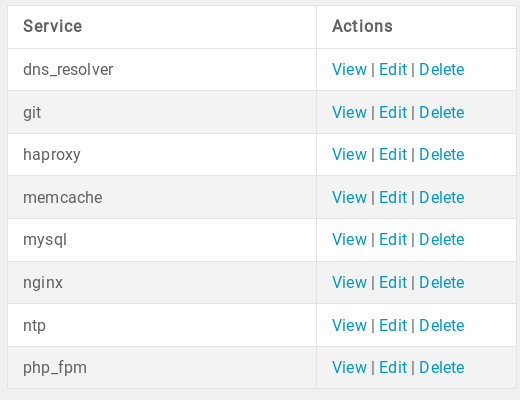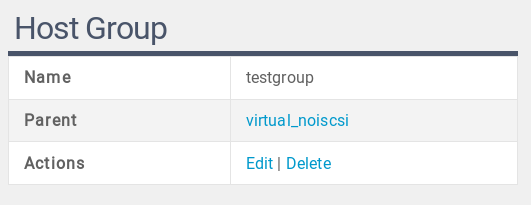sergiosgc / negotiated-output-components
Set of HTML components to be used with the negotiated-output templating system
Installs: 0
Dependents: 0
Suggesters: 0
Security: 0
Stars: 1
Watchers: 1
Forks: 0
pkg:composer/sergiosgc/negotiated-output-components
Requires
- php: >=7.0.0
This package is auto-updated.
Last update: 2026-01-19 05:53:26 UTC
README
Set of HTML components to be used with the negotiated-output templating system
list.table
list.table transforms an array of row values into a table. Example output:
Example code
\sergiosgc\output\Negotiated::$singleton->template('/_/sergiosgc/list.table/',
[ 'list' => [
'class' => 'service-list',
'columns' => [
'name' => [
'label' => _('Service'),
],
'action' => [
'label' => _('Actions'),
'links' => [
[
'href' => '/service/%<id>',
'label' => _('View')
],
[
'href' => '/service/edit/%<id>',
'label' => _('Edit')
],
[
'href' => '/service/%<id>?x-verb=DELETE',
'class' => 'delete',
'label' => _('Delete')
]
]
]
],
'rows' => $services
]]);
Argument specification
list.table will act on the template variable list. This variable is an associative array containing these entries:
- class(optional) The HTML class of the resulting table
- columns Associative array of properties. Each property produces one column in the table. Each property is one of:
- Value property. The key matches the a key in
list/rows/*and the value is an associative array optionally containing alabelentry. - Link set property. The key is irrelevant. The content is an associative array containing an optional
labeland a mandatorylinksassociative array. Each entry in thelinksarray contains:- href A format string to be fed into
\sergiosgc\sprintfalong with the currentlist/rowsarray, for producing the link href. You may use named conversion specifiers, as per the\sergiosgc\sprintfdocumentation. - label The link label
- class(optional) The link class
- href A format string to be fed into
- Value property. The key matches the a key in
- rows A regular array of associative arrays (or \ArrayAccess instances) of values. You must include values for value properties defined in
list/columns. You may include extra values, namely for consumption by conversion specifiers in generating links.
html.element
html.element produces generic HTML.
Example code
\sergiosgc\output\Negotiated::$singleton->template('/_/sergiosgc/html.element/',
['html.element' => [
'element' => 'div',
'@class' => 'buttons',
'children' => [
[
'element' => 'a',
'@href' => '/reconfigure/
'@class' => 'button',
'children' => [
[
'text' => _('Reconfigure')
]
]
],
[
'element' => 'a',
'@href' => '/launch/
'@class' => 'button primary',
'children' => [
[
'text' => _('Launch')
]
]
]
]
]]);
Argument specification
html.element will act on a template variable named html.element. This variable contains a definition of an HTML node (either an element, HTML source or a text node).
For a text node, define a text entry, with the text.
For raw HTML, define a raw entry with the source code.
For an element entry, define:
- An element entry with the tag name of the element.
- An optional set of attribute entries, each named after the attribute name preceded by
@. - An optional
childrenentry. If defined, it should be an array of associative arrays, where each associative array is an HTML element as defined in this argument specification.
menu.ul
menu.ul transforms a menu definition into a menu defined as an recursing unordered list, suitable for producing main menus:
Example code
\sergiosgc\output\Negotiated::$singleton->template('/_/sergiosgc/menu.ul/', [
'menu' => [ 'items' => [
[
'href' => '/',
'active' => true,
'label' => _('Home')
],
[
'href' => '/hosts/',
'label' => _('Hosts'),
'submenu' => [
[
'href' => '/host/new/',
'label' => _('New')
]
]
],
[
'href' => '/host-groups/',
'label' => _('Host Groups'),
'submenu' => [
[
'href' => '/host-group/new/',
'label' => _('New')
]
]
],
[
'href' => '/services/',
'label' => _('Services'),
'submenu' => [
[
'href' => '/service/new/',
'label' => _('New')
]
]
],
]
]);
Argument specification
menu.ul acts on a template menu variable. This is an associative array, with an items entry defining the menu.
The items entry is an array of menu entries. Each menu entry is an associative array with a mandatory label and optional:
- href Link to be applied to label
- active Whether the menu entry is active
- submenu A submenu definition, as an array of menu entries.
paginator
paginator produces a paginator, similar to this:
Example code
\sergiosgc\output\Negotiated::$singleton->template('/_/sergiosgc/paginator/',
[ 'paginator' => [
'page' => $currentPage,
'pageCount' => $pageCount,
'visible' => 3,
'queryArgumentsWhitelist' => [ 'q' ]
]]);
Argument specification
paginator will act on a paginator template variable. This variable is an associative array with these mandatory parameters:
- page The current page
- pageCount The total number of pages
Additionally, these optional parameters may be defined:
- class HTML class for the paginator. Defaults to
paginator. - visible How many pages are visible. Defaults to 3.
- linkHref
\sergiosgc\sprintfconversion specifier for generating page links. Conversion specifiers may refer topagefor the linked page, as well as any variable defined in the paginator template variable. Defaults to %<page> - linkLabel
\sergiosgc\sprintfconversion specifier for generating page link labels. Conversion specifiers my refer topagefor the linked page, as well as any variable defined in the paginator template variable. Defaults to %<page> - startLinkLabel Label for the link to page 1. Defaults to
|<. - endLinkLabel Label for the link to the last page. Defaults to
>|. - skipUpLinkLabel Label for the link for skipping visible pages up. Defaults to
>>. - skipDownLinkLabel Label for the link for skipping visible pages down. Defaults to
<<. - preserveQueryArguments Should links include query arguments? True/False, defaults to false.
- queryArgumentsWhitelist If preserveQueryArguments is false, nevertheless append query arguments in this array to generated links. Defaults to an empty array.
- queryArgumentsBlacklist If preserveQueryArguments is true, nevertheless skip appending query arguments in this array to generated links. Defaults to an empty array.
propertylist.table
propertylist.table transforms an associative array of properties [ 'property' => $value ] into a table with one property per row and two columns per row (label and value). Example output:
Example code
\sergiosgc\output\Negotiated::$singleton->template('/_/sergiosgc/propertylist.table/',
[ 'property-list' => [
'class' => 'hostgroup-view',
'properties' => [
'name' => [ 'label' => _('Name') ],
'parent' => [ 'label' => _('Parent') ],
'action' => [
'label' => _('Actions'),
'links' => [
[
'href' => '/host-group/edit/%<id>',
'label' => _('Edit')
],
[
'href' => '/host-group/%<id>?x-verb=DELETE',
'class' => 'delete',
'label' => _('Delete')
]
]
]
],
'value' => $hostGroup
]]);
Argument specification
propertylist.table will act on the template variable property-list. This variable is an associative array containing these entries:
- class(optional) The HTML class of the resulting table
- properties Associative array of properties. Each property produces one row in the table. Each property is one of:
- Value property. The key matches the a key in
property-list/valueand the value is an associative array optionally containing alabelentry. - Link set property. The key is irrelevant. The content is an associative array containing an optional
labeland a mandatorylinksassociative array. Each entry in thelinksarray contains:- href A format string to be fed into
\sergiosgc\sprintfalong with theproperty-list/valuearray, for producing the link href. You may use named conversion specifiers, as per the\sergiosgc\sprintfdocumentation. - label The link label
- class(optional) The link class
- href A format string to be fed into
- Value property. The key matches the a key in
- value An associative array (or \ArrayAccess instance) of values. You must include values for value properties defined in
property-list/properties. You may include extra values, namely for consumption by conversion specifiers in generating links.




